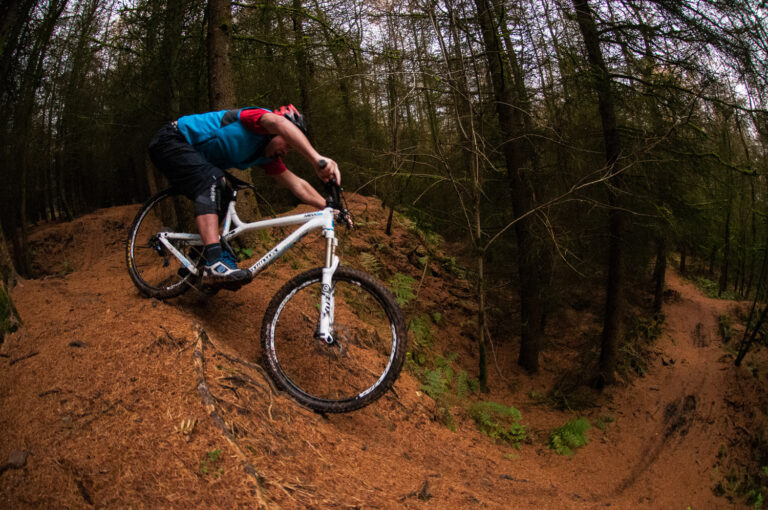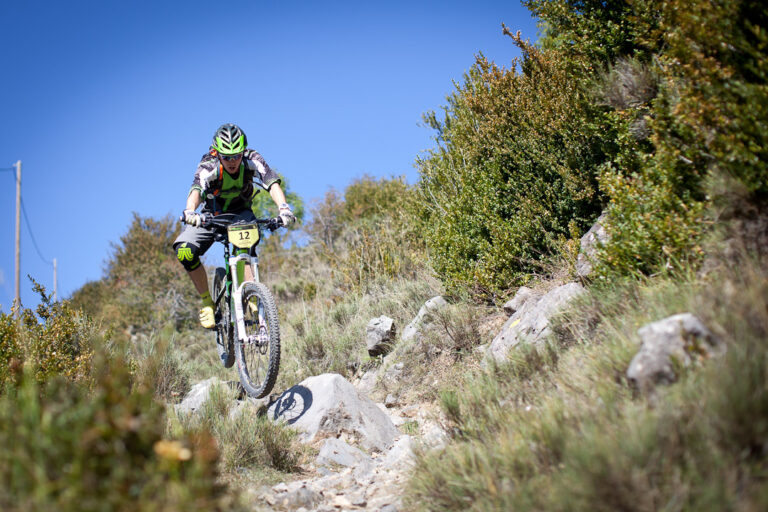Brant Richards designed the UK’s first 29er frame nearly a decade ago. In this column he talks through the development of the bigger wheelsize and the hurdles he’s faced along the way.
We launched the On-One Inbred 29er about seven years ago now. And until they arrived, I don’t think I’d ever ridden one. I just slammed the geometry down, doing a bit of wiggling around to make things fit. I read a lot. Talked to a few people and had some ideas too.
The first bikes were designed thus: Head angle, 72 degrees (where it would fit). This was two degrees steeper than the standard Inbred. Handling back then was all about “fast” and “singletrack” and “making bikes handle fast” was a desirable thing. So I did the sums, looked at the trail generated and found that increasing the head angle by 1.5degs made things work about the same for a given fork length. I increased it by another half a degree as I figured having a bigger wheel flopping about we’d be better off making it a bit quicker. The 16in frames had a 71deg head angle because otherwise the front tyre hit your toes.
 These numbers are how I quote numbers though – those are “sagged” dimensions when you’re sat on the bike with 30% sagged forks. It’s good in determining how a bike rides. “Static” dimensions with an extended fork are fine for comparing similar travel bikes, but the numbers make increasingly less sense as forks get longer. Anyhow… I digress…
These numbers are how I quote numbers though – those are “sagged” dimensions when you’re sat on the bike with 30% sagged forks. It’s good in determining how a bike rides. “Static” dimensions with an extended fork are fine for comparing similar travel bikes, but the numbers make increasingly less sense as forks get longer. Anyhow… I digress…
Chainstay length; 444mm. This ones easy. Niner had just come out with their bikes, and they all have 445mm chainstays. I wanted ours to be 1mm shorter. It all drew up OK and looked good to go.
Fork rake; 47mm. A Dutch bloke called Cloxxki was always on the mtbr forums banging on about fork rake, so we made our forks with a 47mm rake to shut him up. I understood the geometrical implications and it made sense. He was a head down racer boy, which is how all the scene was back then really.
Top tube lengths, seat angles, bottom bracket height, that was all as per the standard 26in frames which have always been long top tube/short stem style. That was a previous mistake that worked out well actually. The bikes rode great, and we were in a small way responsible for getting people out there on big wheels. I seem to remember we made some complete bikes? I can’t actually remember.
I rode 29in wheels a lot. Even though we made the 456 during this time, I was riding 29in wheels. Right up until I started riding with Ed from Great Rock. There was a ride we did from Hebden that truly changed my life. I was with a bunch of lads with long travel, big tyred hardtails, riding proper steep stuff. I was a bit more long rides and tracks across the moor until that point. And when I made a good attempt at getting down stuff on my rigid 29er, I found that I was struggling. It was funny, but that day, the die was cast – for me – 26in wheels, shod with big carcass 26in supertacky tyres and long travel forks were the way. I liked my 29er a lot, but the tyre technology, even the fork technology wasn’t up there.
And that’s what I’ve ridden ever since. But now? This year? That’s changing.
It’s changing for several reasons – firstly at On-One, we’re commited to the 29er cause and now have the capacity to work with Maxxis on our own mould 29in tyres, so soon I’ll finally have my big carcass supertacky aggressive tyre that I always wanted. And you’ll be able to buy them too. Also, for the last couple of years, forks are now bolt though and stiffer. RockShox will even now sell me a Revelation with 140mm travel and a bolt through axle. Tyres and forks. That’s the important stuff. Because those let you push things harder.
So for the new On-One steel frames just arriving, we’ve slackened the head angle a degree to make things a bit more stable and fun to get the most from those tyres and the forks you can plug in. For Titus, we’re working on a 29in El Guapo platform which is in development right now. And for Planet X we’ve got a new 29in wheeled carbon race bike (and an aluminium brother on the way).
 Better? Impossible to say. Different? Certainly. Replacing 26in? Not a chance. It’s another size, another option. The thing I really hope that will happen is that bikes will be defined by their riding characteristics, rather than their wheelsize, (frame material is another thing they get defined by which I find quite odd).
Better? Impossible to say. Different? Certainly. Replacing 26in? Not a chance. It’s another size, another option. The thing I really hope that will happen is that bikes will be defined by their riding characteristics, rather than their wheelsize, (frame material is another thing they get defined by which I find quite odd).
So I predict – 29in bikes will become bikes. 26in bikes are bikes already. 650B? They’ll be those bikes you can’t get tyres for anymore. Not that you can now. Which is good as we’ll all have someone to laugh at. And everyone likes someone to laugh at.



